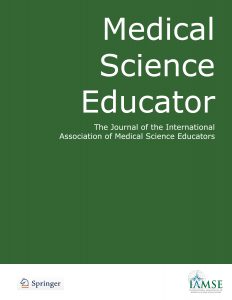
Every month, the IAMSE Publications Committee reviews published articles from the archives of Medical Science Educator or of its predecessor JIAMSE. This month’s review is taken from MSE volume 26.
The importance of training students to integrate concepts of ethics into medical conversations is becoming increasingly important in an era of personalized medicine. Conversations regarding the implications of genetic information including variants of known and unknown significance require an understanding of ethical concepts including patient welfare, respect for autonomy, social justice and shared decision making. Often, however, the topics of ethics and medical genetics are taught separately in distinct courses. This creates a challenge in terms of a student’s ability to integrate and transfer prior knowledge to a novel clinical scenario. One approach to address this challenge is discussed in a recent study entitled Design of a Platform to Discuss Ethical Considerations of Preimplantation Genetic Diagnosis: a Case for Integration of Ethics in Foundational Science Medical Curriculum, published in Medical Science Educator, Volume 26 (pages 213-219), 2016, by authors HG Pine, H Gillis, T Weiler and J Fortun from the Herbert Wertheim College of Medicine, Florida International University (FIU).
FIU developed an approach utilizing a large case-based discussion (CBD) integrating ethics and medical genetics that takes place towards the end of two concurrent courses in “Genes, Molecules and Cells” and “Ethical Foundations in Medicine”. Students were given an opportunity to apply and transfer prior knowledge from these course to a novel clinical scenario involving a preimplantation genetic diagnosis. The activity included learning objectives for both genetics and ethics. Students were required to defend their reasoning for embryo transfer recommendations and to address shared decision making. Two iterations of these sessions took place in two subsequent years. The first iteration was assessed for student satisfaction of the integration by a five-point Likert scale with comments. The second iteration included, in addition, a pre- and post-CBD multiple choice question quiz designed to test transfer of prior knowledge. During the first iteration, the diagnostic and ethical considerations were discussed separately, while in the second iteration the diagnostic and ethical considerations were discussed simultaneously.
Based on the analysis of the scores and comments, students were satisfied with the sessions. The authors found that the assessments of the second, more integrated session, in which ethical issues were discussed simultaneously with genetic issues, yielded higher Likert scores and more frequent positive comments surrounding the success, importance and value of the integration. The analysis of the pre- and post-CBD quizzes showed a statistically significant improvement in correct responses. These results suggest that transfer of prior knowledge to novel clinical scenarios can be promoted by integrated sessions, particularly when the integrated topics are discussed simultaneously rather than sequentially.